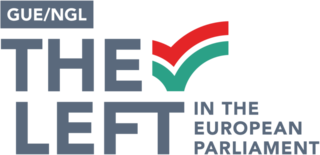
The European Union (EU) is a supranational political and economic union of 27 member states that are located primarily in Europe. The union has a total area of 4,233,255 km2 (1,634,469 sq mi) and an estimated total population of over 448 million. The EU has often been described as a sui generis political entity combining the characteristics of both a federation and a confederation.

The European Economic Community (EEC) was a regional organisation created by the Treaty of Rome of 1957, aiming to foster economic integration among its member states. It was subsequently renamed the European Community (EC) upon becoming integrated into the first pillar of the newly formed European Union in 1993. In the popular language, however, the singular European Community was sometimes inaccurately used in the wider sense of the plural European Communities, in spite of the latter designation covering all the three constituent entities of the first pillar.

The European Parliament (EP) is one of the legislative bodies of the European Union and one of its seven institutions. Together with the Council of the European Union, it adopts European legislation, following a proposal by the European Commission. The Parliament is composed of 705 members (MEPs). It represents the second-largest democratic electorate in the world, with an electorate of 375 million eligible voters in 2009.

The European People's Party Group is a centre-right political group of the European Parliament consisting of deputies (MEPs) from the member parties of the European People's Party (EPP). Sometimes it also includes independent MEPs and/or deputies from unaffiliated national parties. The EPP Group comprises politicians of Christian-democratic, conservative and liberal-conservative orientation.

The Left in the European Parliament – GUE/NGL is a left-wing political group of the European Parliament established in 1995. Before January 2021, it was named the European United Left/Nordic Green Left.

The European Commission (EC) is part of the executive of the European Union (EU), together with the European Council. It operates as a cabinet government, with 27 members of the Commission headed by a President. It includes an administrative body of about 32,000 European civil servants. The Commission is divided into departments known as Directorates-General (DGs) that can be likened to departments or ministries each headed by a Director-General who is responsible to a Commissioner.

Euroscepticism, also spelled as Euroskepticism or EU-scepticism, is a political position involving criticism of the European Union (EU) and European integration. It ranges from those who oppose some EU institutions and policies, and seek reform, to those who oppose EU membership and see the EU as unreformable. The opposite of Euroscepticism is known as pro-Europeanism, or European Unionism.

The president of the European Commission is the head of the European Commission, the executive branch of the European Union (EU). The president of the Commission leads a cabinet of Commissioners, referred to as the College. The president is empowered to allocate portfolios among, reshuffle, or dismiss Commissioners as necessary. The College directs the commission's civil service, sets the policy agenda and determines the legislative proposals it produces. The commission is the only body that can propose or draft bills to become EU laws.

A member of the European Parliament (MEP) is a person who has been elected to serve as a popular representative in the European Parliament.

A European political party, known formally as a political party at European level and informally as a Europarty, is a type of political party organisation operating transnationally in Europe and within the institutions of the European Union. They are regulated and funded by EU Regulation No. 1141/2014 on European Political Parties and European Political Foundations and their operations are supervised by the EU Authority for European Political Parties and European Political Foundations. Europarties - usually made up of national parties, not individuals - have the exclusive right to campaign during the European elections and express themselves within the European Parliament by their affiliated political groups and their MEPs. Europarties influence the decision-making process of the European Council through coordination meetings with their affiliated heads of state and government. They also work closely and co-ordinate with their affiliated members of the European Commission.

Elections to the European Parliament take place every five years by universal adult suffrage; with more than 400 million people eligible to vote, they are considered the second largest democratic elections in the world after India's.

Elections in Spain encompass four different types: general elections, regional elections, local elections, and elections to the European Parliament. General elections and regional elections are typically conducted at the conclusion of the national or regional legislative mandate, which usually spans four years since the previous election. However, early elections can be called in certain circumstances. On the other hand, local council elections and elections to the European Parliament follow fixed dates, although some local government bodies, such as provincial councils, are not directly elected. In most elections, a party-list proportional representation (PR) system is employed, while the Senate utilizes the plurality system.

The political groups of the European Parliament are the officially recognised political groups consisting of legislators of aligned ideologies in the European Parliament.

The political structure of the European Union (EU) is similar to a confederation, where many policy areas are federalised into common institutions capable of making law; the competences to control foreign policy, defence policy, or the majority of direct taxation policies are mostly reserved for the twenty-seven state governments. These areas are primarily under the control of the EU's member states although a certain amount of structured co-operation and coordination takes place in these areas. For the EU to take substantial actions in these areas, all Member States must give their consent. Union laws that override State laws are more numerous than in historical confederations; however, the EU is legally restricted from making law outside its remit or where it is no more appropriate to do so at a state or local level (subsidiarity) when acting outside its exclusive competences. The principle of subsidiarity does not apply to areas of exclusive competence.

Members of the European Parliament (MEPs) are elected by the population of the member states of the European Union (EU). The European Electoral Act 2002 allows member states the choice to allocate electoral subdivisions or constituencies for the European Parliament elections in several different ways.

The European Union (EU) is a political and economic union of 27 member states that are party to the EU's founding treaties, and thereby subject to the privileges and obligations of membership. They have agreed by the treaties to share their own sovereignty through the institutions of the European Union in certain aspects of government. State governments must agree unanimously in the Council for the union to adopt some policies; for others, collective decisions are made by qualified majority voting. These obligations and sharing of sovereignty within the EU make it unique among international organisations, as it has established its own legal order which by the provisions of the founding treaties is both legally binding and supreme on all the member states. A founding principle of the union is the principle of subsidiarity, meaning that decisions are taken collectively if and only if they cannot realistically be taken individually.

The European Conservatives and Reformists (ECR) is a soft Eurosceptic, anti-federalist political group of the European Parliament. The ECR is the parliamentary group of the European Conservatives and Reformists Party European political party (formerly known as the Alliance of Conservatives and Reformists in Europe or Alliance of European Conservatives and Reformists, but also includes MEPs from four other European parties and thirteen MEPs without European party affiliation.

The Progressive Alliance of Socialists and Democrats (S&D) is the political group in the European Parliament of the Party of European Socialists (PES). The Progressive Alliance of Socialists and Democrats was officially founded as a Socialist Group on 29 June 1953 which makes it the second oldest political group in the European Parliament after Renew Europe (Renew). It adopted its present-day name on 23 June 2009. Centre-left in orientation, the group mostly comprises social-democratic parties and is affiliated with the Progressive Alliance and Socialist International.

Brexit was the withdrawal of the United Kingdom (UK) from the European Union (EU) at 23:00 GMT on 31 January 2020. The UK is the only sovereign country to have left the EU. The UK had been a member state of the EU or its predecessor the European Communities (EC), sometimes of both at the same time, since 1 January 1973. Following Brexit, EU law and the Court of Justice of the European Union no longer have primacy over British laws. The European Union (Withdrawal) Act 2018 retains relevant EU law as domestic law, which the UK can amend or repeal.

The 2024 European Parliament election is scheduled to be held on 6 to 9 June 2024. This will be the tenth parliamentary election since the first direct elections in 1979, and the first European Parliament election after Brexit.












